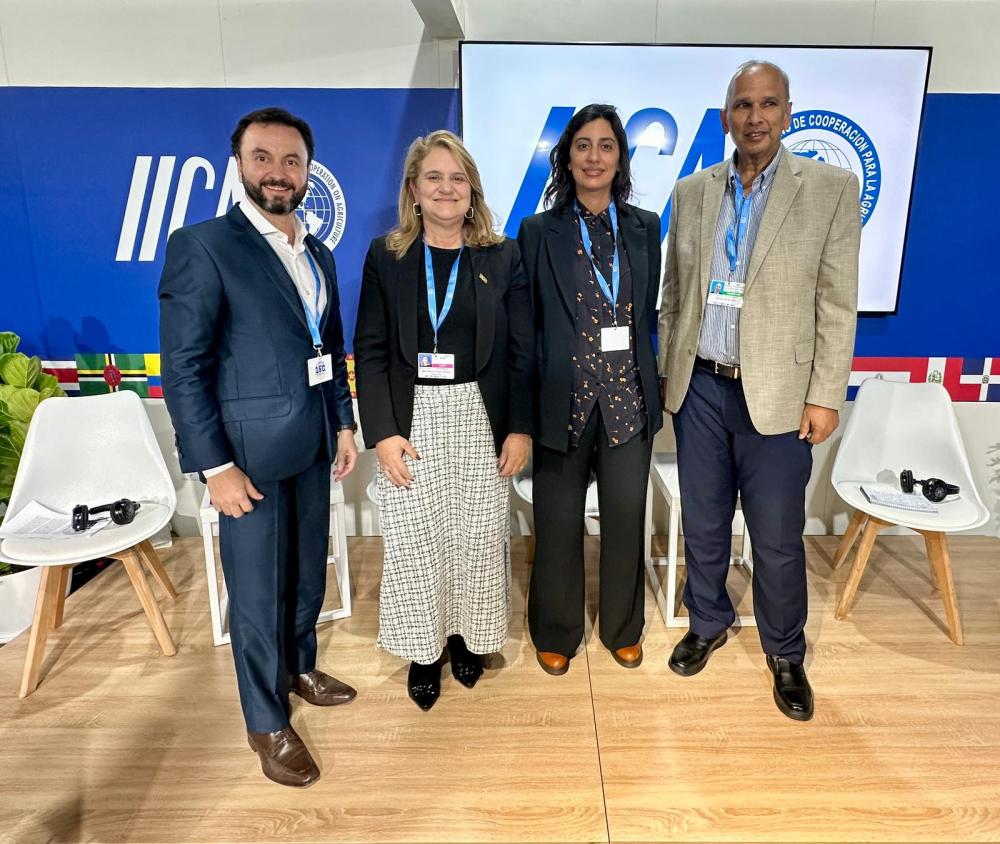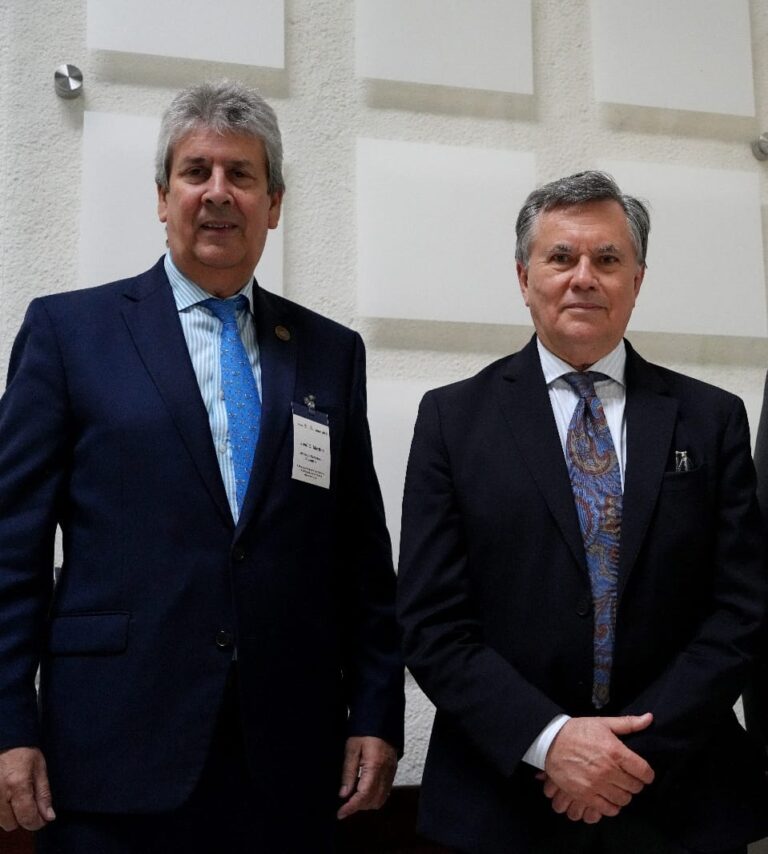The presence of the head of EMBRAPA at the IICA pavilion in Baku follows the signing of an agreement between the two institutions to facilitate international technical cooperation actions and promote the sharing of public policies, technologies and knowledge for the benefit of the agriculture sector.

BAKU, Azerbaijan, 18 November 2025 (IICA). A shared vision of sustainable livestock farming that identifies knowledge gaps, unites stakeholders in the value chain, and highlights the distinguishing characteristics of cattle production in the Southern Cone of the Americas that enable it to provide the world with a safe source of protein with high nutritional value, while at the same time preserving the environment.
This was the overarching message of the panel discussion “Sustainable Livestock Production in the Southern Cone of the Americas,” organized by the Brazilian Agricultural Research Corporation (EMBRAPA) and the Inter-American Institute for Cooperation on Agriculture (IICA) at the Home of Sustainable Agriculture of the Americas pavilion, installed at COP29, the most important global forum for environmental negotiations, which is taking place in Baku, Azerbaijan.
The panel participants included Silvia Massruhá, the President of EMBRAPA; Muhammad Ibrahim, Director of Technical Cooperation at IICA; Diego Gauna, Coordinator of the Sustainable Livestock Farming Platform (PGBS), a joint initiative of IICA and the Inter-American Development Bank (IDB); Elly Navajas, Coordinator of the Sustainable Livestock Working Group of PROCISUR (Cooperative Program for the Agrifood and Agroindustrial Technological Development of the Southern Cone); Liege Correia, Director of Sustainability at the animal protein giant JBS; and Hsin Huang, from the Global Agenda for Sustainable Livestock (GASL).
The moderator of the event was Bruno Brasil, Director of Sustainable Production and Irrigation at Brazil’s Ministry of Agriculture and Livestock.
Massruhá, the first woman to head EMBRAPA, said the bigger the investment in science, the greater will be the impact of the agricultural Gross Domestic Product (GDP) on Brazil’s economy as a whole. She pointed out that in her country, a global agrifood powerhouse, the development of agricultural technologies over the past five decades has made it possible to raise productivity by 580 percent, while only expanding the agricultural area by 140 percent.
She also informed the other members of the panel that EMBRAPA is developing robust metrics to evaluate the environmental impact of livestock production, and provide tools that can facilitate political and business decision-making.
She also described Brazil’s National Program for the Conversion of Degraded Pastures into Sustainable Agricultural and Forestry Production Systems, designed to serve as a sustainable practice to ensure food security, and at the same time reduce the impact of climate change by intensifying food production without increasing deforestation in conservation areas and employing practices that lead to zero carbon emissions.
The presence of the head of EMBRAPA at the IICA pavilion in Baku follows the signing of an agreement between the two institutions to facilitate international technical cooperation actions and promote the sharing of public policies, technologies and knowledge for the benefit of the agriculture sector.
Signed in Brasilia in August by the President of EMBRAPA and the Director General of IICA, Manuel Otero, the agreement calls for the implementation of an international program of joint work to strengthen agricultural research and innovation, and the global positioning of sustainable agriculture.
The measures contemplated include the financing of agricultural research exchanges that would facilitate the presence of African researchers in Brazil, specifically at EMBRAPA, to foster the development of regenerative tropical agriculture in Africa; and joint work in institutional spaces at COP29 in Azerbaijan and COP30, which Brazil will be organizing in 2025.
The IICA pavilion at the COP has become an important space for governments, research entities and the private sector in the Americas to demonstrate the total commitment of the hemisphere’s agriculture to food security and global sustainability, also helping to raise awareness and position agriculture in general as a key activity for peace, sustainable development, and the decarbonization of the economy.
The mission of the Brazilian Agricultural Research Corporation (EMBRAPA), widely regarded as one of the world’s most important agricultural research organizations, is to provide innovations, knowledge generation, and technologies for Brazil’s agriculture.
Founded in 1973, it is a state-owned enterprise dedicated to developing the technological underpinnings of a genuinely tropical model of crop and livestock farming, and guaranteeing Brazil food security and a position of leadership in international food, fiber and energy markets.
Diego Gauna referred to the Sustainable Livestock Farming Platform, whose aim is also to study in depth various areas of sustainability, including resilience, animal health, ecosystem services, biodiversity, traceability, and the use of water resources.
In the Southern Cone countries of the Americas (Argentina, Brazil, Bolivia, Chile, Paraguay and Uruguay), 680 million hectares of land are used for livestock farming.
There 3.3 million producers (70-80 percent of whom are family farmers) and 327 million heads of cattle.
The region also accounts for 26.8 percent of global beef production and 40.5 percent of global beef exports. The beef and dairy cattle subsector accounts for 21-25 percent of the gross value of the agriculture sector in Latin America.
“This is a core sector thanks to its nutritional contributions; it also plays a crucial role in balanced territorial development and is key to combating climate change,” Brasil said.
Elly Navajas spoke about the economic and social importance of beef production, and its contributions to food security and ecosystem services and biodiversity.
Liege Correa highlighted Brazil’s capacity to recover pastures for livestock and grains, and to contribute to advances in regenerative agriculture and livestock farming, in the process of integration for soil conservation, and in the integration of crop and livestock farming and conservation.
In closing the discussion, Muhammad Ibrahim emphasized the need for soil conservation, IICA’s support for PROCISUR, and the need for crop rotation and plant cover.
More information:
Institutional Communication Division.
comunicacion.institucional@iica.int











